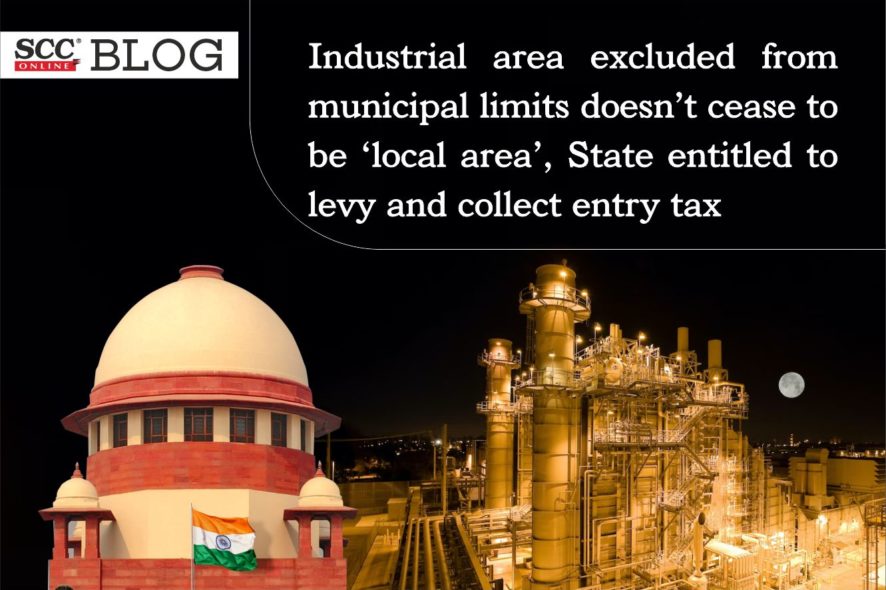Supreme Court: In an appeal relating to the interpretation of ‘local area' occurring under Entry 52 of List II of the Seventh Schedule to the Constitution, the three-judge bench of Uday Umesh Lalit, C.J., S. Ravindra Bhat* and J.B. Pardiwala, JJ. observed that the object of entry tax is the regulation of entry of goods in a regular area for consumption. Further, the entry of goods into an industrial area is for their use for manufacturing or for processing or for the purposes of their delivery as their ultimate point of destination, i.e., for the purpose of their “consumption, use or sale” within that area. Thus, it was held that the levy would be attracted because the incidence is the entry into the local area.
The issue in this appeal was, whether the exclusion of industrial areas from the limits of municipal councils or municipalities under the state laws in exercise of statutory power or by virtue of a declaration under proviso to Article 243-Q, would result in that area ceasing to be a ‘local area' within Entry 52 of List II, and consequently precluding State from levying and collecting entry tax from those areas.
The Court took note of Entry 52 of List II which authorises State Legislatures to levy entry tax and states that “taxes on the entry of goods into a local area for consumption, use or sale therein”, and said that the term ‘local area' has not been defined in the Constitution; however, the General Clauses Act, 1897(‘GC Act'), define a ‘local authority' as “a municipal committee, district board, body of port commissioners or other authority legally entitled to, or entrusted by the Government with, the control or management of a municipal or local fund”.
The Court took note of Saij Gram Panchayat v. State of Gujarat, (1999) 2 SCC 366, MGR Industries Assn. v. State of U.P., (2017) 3 SCC 494 and NOIDA v. CIT, (2018) 9 SCC 351 , that are relied on by the appellants and said that in all the decisions it was held that “the exclusion of an area from the limits of a municipality ipso facto did not result in its eligibility to seek tax exempt status”.
The Court took note of Diamond Sugar Mills Ltd. v. State of U.P., AIR 1961 SC 652 wherein it was held that “a ‘local area' would be an area which is administered by a local body such as a municipality, a district board, a local board, a Panchayat or the like and that factory premises are not covered by the aforesaid expression”, and said that this articulation is relevant because the levy of tax involved in this decision imposed a duty on the entry of goods into factory premises, thus, it was correctly held that the entry tax can be imposed in relation to a local area, and the incidence is the point of entry.
The Court noted that in the present case, two or more sets of law operate within the two states. The first set of statutes are the enactments, that impose the levy, which is entry tax, and the incidence is entry into a local area. A ‘local area' is defined as including industrial establishments, or estates. The second set of laws that are involved are the municipalities laws, such as the Orissa Act of 1950, which by proviso to Section 4 (1) excludes industrial areas, from the rigours and requirements of the municipalities' enactments.
Further, the Court relied on Kishansing Tomar v. Municipal Corpn., Ahmedabad, (2006) 8 SCC 352, wherein the object and purpose of Constitution (seventy-fourth) Amendment Act, 1992 was discussed, and said that the special features of the municipalities contemplated by the provisions contained in Part IX-A, however, need not be present in other bodies created by law, but such statutory bodies, like industrial estates, may perform some municipal functions. However, this does not ipso facto result in their acquiring the features of municipalities which are contemplated by Part IX-A of the Constitution.
The Court said that the focus of provisions of Part IX-A of the Constitution was on local self-governance and all provisions concerning it, had no relevance to the issue of State taxation. Further, the exercise of power by the Governor to exclude from the limits of a municipal area, industrial estates or large areas that were predominantly industrialised areas is upon the condition, that such areas provided a minimum modicum of municipal services.
The Court said that the reliance placed upon Diamond Sugar Mills (supra) by the appellants in this case is misplaced, because in that decision, the Court had to deal with a different set of facts, as the levy on sugarcane imposed by the State of U.P. was on the incidence of entry into factory premises, therefore, it was correctly concluded that factory premises per se could not constitute a local area. The subsequent decision in Shaktikumar M. Sancheti v. State of Maharashtra, (1995) 1 SCC 351explained that entry into the State with the ultimate destination within the State, constituted a taxable event the moment the goods, i.e., the vehicles reached within the limits of municipality of its ultimate destination.
The Court further said that it is a cardinal rule of interpretation that words of a taxing statute should be read in their ordinary, natural, and grammatical meaning, and in construing a constitutional enactment that confers legislative power, a liberal construction should be placed upon the words so that they may have effect in their widest amplitude.
The Court opined that the argument that the levy could not be retrospective is insubstantial. Thus, it found no reason to interfere with the decision of the Orissa and Allahabad High Courts.
[OCL India Ltd. v. State of Orissa, 2022 SCC OnLine SC 1518 , decided on 04-11-2022]
*Judgment by: Justice S. Ravindra Bhat
*Apoorva Goel, Editorial Assistant has reported this brief.



